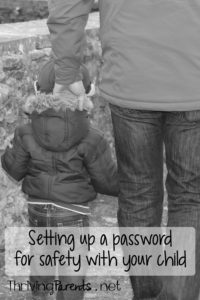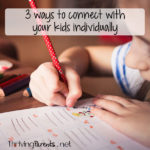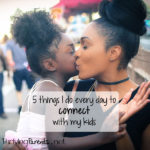
A few years ago I was spending about 11 hours in the car every week driving to and from school. The girls went to two different schools and I drove from one school in one town to the other school in another town. Pick up was at two different times, hours apart.
One day I was stuck in traffic at an accident on the highway. It was looking like I was going to be late for pick up and I started to get nervous. I hadn’t mentioned to Katherine that I would be late and she hadn’t stayed for after care yet at this point. My mom wasn’t available to pick her up but I knew I could call my friend, Amy to get her. Amy had enough car seats in her car that she could safely get her and bring her to meet me. The problem was Katherine hadn’t seen Amy in almost a year and I don’t think she would have known who she was. That got me thinking:
There are certain people I absolutely trust with my children. I know they would be there for me and the kids in a heartbeat but my children don’t really know them. That’s understandable as my friend Amy, for example, and I talk on the phone every day and we see each other a few times a month but it’s while our kids are in school. Once the kids are home from school, that’s our family time.
I wanted to come up with a way for Amy, or another close friend, to be able to pick up any of the girls and for the girls to know it was safe to go with this “stranger.” And that’s how the password was born.
When I send anyone other my own mother to pick up the girls from school, the adult who is there needs to give them a password, even if they know that adult. If the adult doesn’t say the password, they shouldn’t go with the adult. This was a really good idea I though. It was like using one of your favorite password managers, just this one wasn’t on the computer!
What this looks like:
“There may be times when you are at school or somewhere else and I may not be able to get to pick you up on time. I want you to know that if I can’t get to you and another adult picks you up, they need to say a special word for you to know that it’s safe to go with them.”
Your child will probably ask why you need a password. I explained it like this: “You know how Mommy is good friends with Miss Amy? If I ever needed Miss Amy to come and pick you up, would you remember what she looks like? I didn’t think so. You might, but you also might not. This way if I send her or someone else to pick you up and they tell you the password, you’ll know that I sent them to come and get you. If they know the password that means they’re a safe person to go with and they’ll bring you to me.”
“Our special word needs to be a secret. I know we don’t keep secrets from each other but this word needs to be secret from everyone else. You can not tell this word to anyone – even your best friend/ cousin/ neighbor. We need to keep this word secret so that you know the person picking you up is safe to go with.”
Chances are your child is going to ask why you may not pick them up. Explain that you could be running late from the doctor, the grocery store, the line at the bank, or just plain old traffic. Whoever picks them up will be bringing them to you.
Decide with your child/ children what the password should be. You want them to be able to remember it so let them have some input. It can be a fruit or vegetable, a number, a street name, a board game, or an animal. Basically any word that is unusual that they can remember. “What should our password be? Do you want it to be a food, a game, a book, a show? What word do you think would be easy for you to remember?”
Then role play what this would look like:
“Let’s pretend you are at school and I’m Miss Amy and I come to pick you up. ‘Hi Katherine, I’m Miss Amy and I came to pick you up.’ Now I want YOU to say, ‘What’s the password?'” At this point, I give the correct password and she can pretend to come with me. Then, I’ll say, “Now let’s try it again.” This time use the wrong password. Ask your child what they’ll do if someone uses the wrong password. You want them to say some version of, “No, thank you. I’ll stay here and wait for my mommy.” You’ll also want your child to tell their teacher or office administrator that the grown up didn’t have the correct password. After you practice this wrong scenario, practice with the correct password again, so the right way is the last message left in their mind.
You’ll probably get a slew of questions about specific people. “What if Uncle Mike picks me up? Can I go with him? What about the neighbor?” etc. You can address this however you need to. For us, anyone besides my mom needs to have the password because it’s so unlikely I’d have anyone else do it.
Over the next few days, ask your child what the password is just to keep it fresh in their mind. You can then start to ask every other day and then once a week. I still occasionally ask our girls and we’ve had the password for a few years.
I didn’t teach this password method until each child was in Kindergarten. Before that age, I think it may be too hard for a child to keep the password a secret. For some kids, this age may still be too hard, so you’ll have to determine when your child is ready. When you do, let them know that you think they are responsible enough to have a password and that will give them a good morale boost, as well.
I like this book about safety, I Can Be Safe. It talks about safety and how it’s important to trust our intuition. It doesn’t imply that strangers are the only people who can hurt us. I also like The Berenstain Bears Learn About Strangers. It emphasizes using common sense.
Have you ever had to have someone else unexpectedly pick your kids up from school?
xoxo
–k
Learn how to talk to your kids about the difference between appropriate and inappropriate touch.

Sexual abuse in children occurs more often than we’d like to think. Talking to your kids about the difference between appropriate and inappropriate touching is crucial. How do you talk to your children about appropriate and inappropriate touching? You start here…
Click here to read how to teach your child what to do if they get lost

No one wants to think about losing their child in a crowded place but it can easily happen. Here’s how to teach your child what to do if they get lost.





